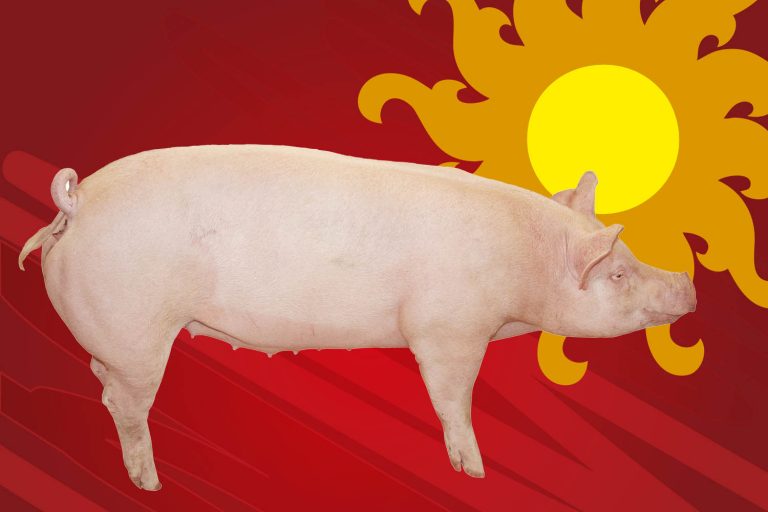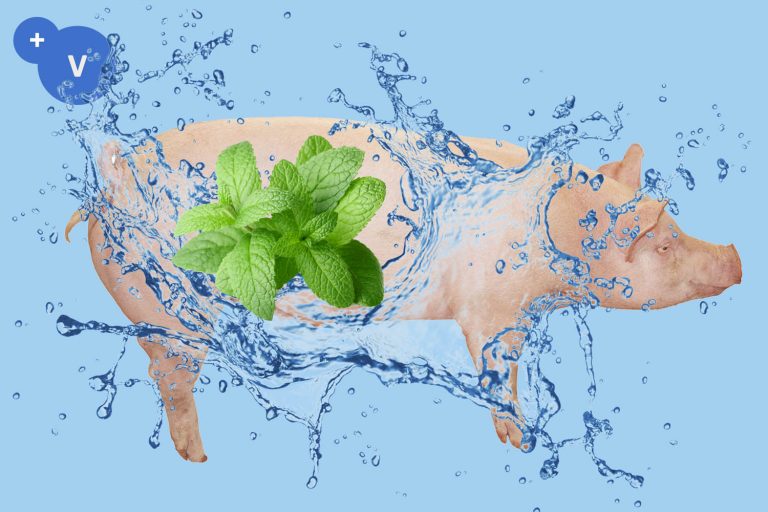08 Aug Consequences of heat stress in boars, gilts and sows

Essential oils with fresh flavor relieve heat stress in boars, sows and gilts
Pigs are more sensitive to high temperatures than other species: they do not sweat, their lungs are small and they are covered by a thick layer of subcutaneous fat. Heat stress affects not only pigs in grower-finisher stage, but also the breeding herd.
Indeed, during the hottest period of the year, many pig farms experience a variety of reproductive problems in boars, gilts and sows. Such problems can be attributed mainly to two factors:
1) Natural breeding cycle is seasonal
Wild pigs do not mate during the hot season, in order to avoid giving birth in winter, when the low temperatures impair the survival of the new born piglets.
Although selection through many generations of domesticated pigs has almost eliminated the seasonal breeding feature, some traces still remain, because physiologically the mating instinct is controlled by the photoperiod.
This problem can be reduced by adjusting the lighting hours during Summer and early Fall.
2) High temperatures inside the house
Environmental temperatures above 26ºC, especially together with high relative humidity, put the breeding herd at risk of heat stress. Temperatures above 30ºC are considered severe emergency levels.
There are three main obvious signs of heat stress in pigs:
- Increased respiration rate: when the pig is resting, the normal respiration rate is 15 to 25 breaths per minute. During early stages of heat stress, the rate increases to 40 breaths/minute, and in more severe cases, it raises to 60 breaths/minute or more.
- Lack of appetite: a lower feed intake allows the pig to cool down its internal temperature.
- Excessive water consumption: during heat stress, the pig may drink up to 6 folds the normal amount of water, which leads to an increased production of urine and a loss of electrolytes. This loss of electrolytes may result in diarrhea and, in severe cases, death. In addition, it has been proven that continue exposure to high temperatures disrupts the defense function of the digestive system, so digestive problems and infections are often associated to heat stress.
In the breeding herd, heat stress causes a variety of problems:
- Boars show reduced libido.
- Reduced fertility, due to poorer semen quality and female infertility
- Reduced appetite in lactating sows, which will affect milk production, the growth and health of the suckling piglets, the time lapsus to the following oestrus and the fertility of the following cycle.
- In extreme cases the pregnant sow may die, especially in the last weeks of pregnancy.
What can we do to reduce the heat stress in breeding pigs?
- Adopt the necessary ventilation and cooling systems to maintain the temperature inside the house below 25ºC.
- Use water to cool down the environment, through a sprinkling or a fogging system. PlusBreathe© can be added to water to boost the cooling down effect.
- Schedule animal activities in the early morning or evening, when temperatures are cooler.
- Reduce the movements of sows and boars as much as possible.
- Let the boars be more in contact with the gilts and sows during oestrus.
- Give cool drinking water to the animals.
- PlusBreathe© can also be added to drinking water, to reinforce the refreshing effect.
- Add a source of eletrolytes such as SupraPlus© to drinking water, to compensate the loss of electrolytes.

- Increase the feeding frequency (4-5 times a day) and give fresh feed, to stimulate feed intake.
- Increase the amount of fat in feed to make it more energetic and compensate the low feed intake.
- Wean as early as possible to reduce the metabolic stress of the lactating sows.
Products of choice
SupraPlus© is intended to maintain and improve digestive health and to improve hydration in poultry, ruminants and swine of all ages. It is given through drinking water and is formulated with synergistic ingredients:
- Bactericidal and fungicidal plant extracts, combined with organic acids for better effectiveness, that reduce the number of pathogenic microbes in the digestive system.
- Plant extracts with prebiotic effect, that promote the growth of beneficial bacteria in the digestive system.
- Electrolytes to maintain hydration
- Sugars that are quickly absorbed and can be easily used as a energy source
- Vitamin E
It is especially useful during the first week of life, to promote a healthy development of the digestive system and improve hydration; in case of digestive diseases, to improve gut health and restore the levels of electrolytes; in episodes of heat stress, to prevent digestive problems, restore the levels of electrolytes and fight with the body oxidation caused by free radicals.
PlusBreathe© contains essential oils with natural antiseptic, antioxidant, expectorant and mucolytic activity. It has a refreshing taste.
It is indicated to improve the functioning of the respiratory system and to mitigate heat stress in birds, ruminants, pigs and rabbits of all ages. It can also be nebulized in the farm environment.

Certain health statements may not be applicable in your region.

